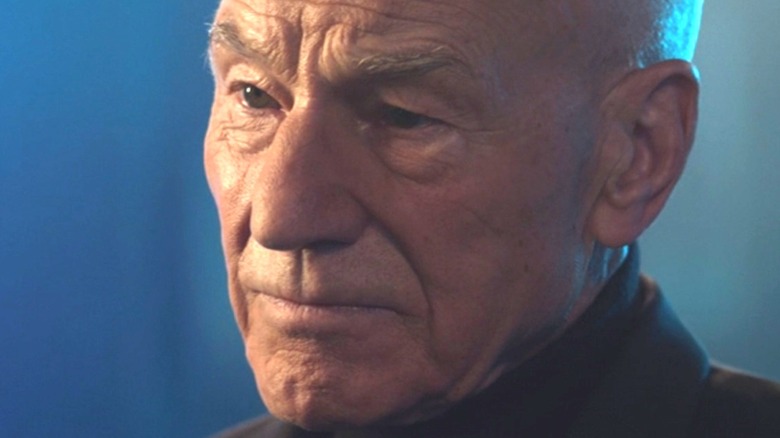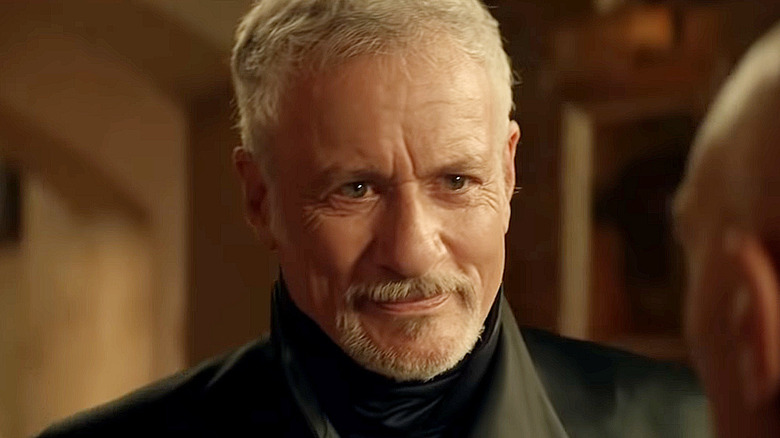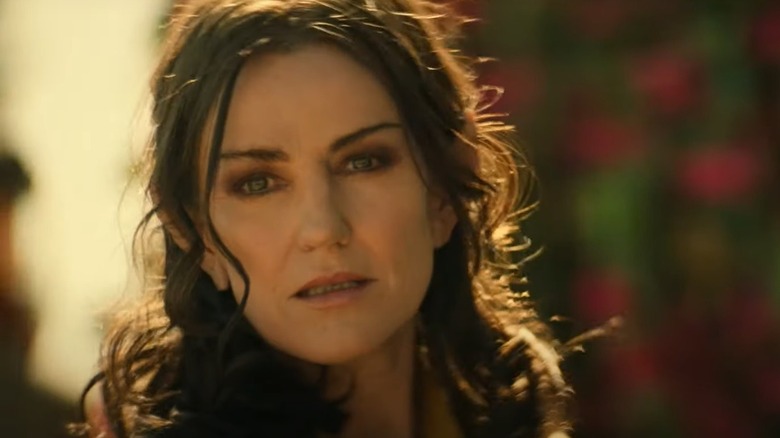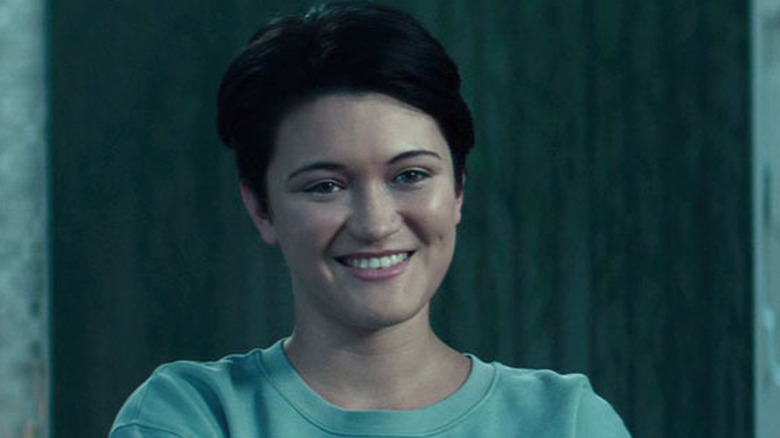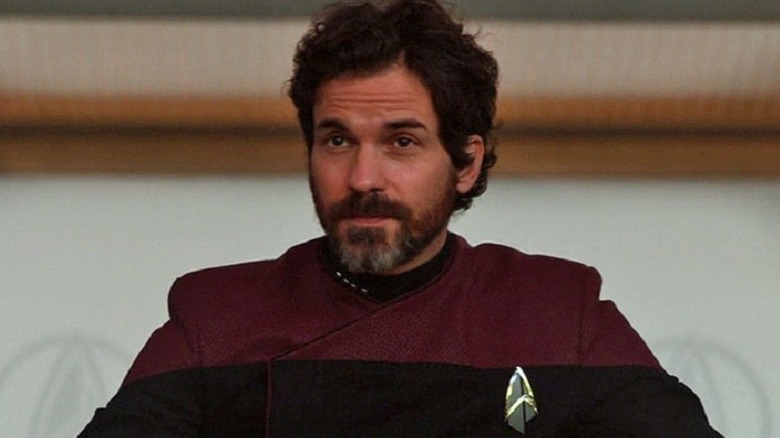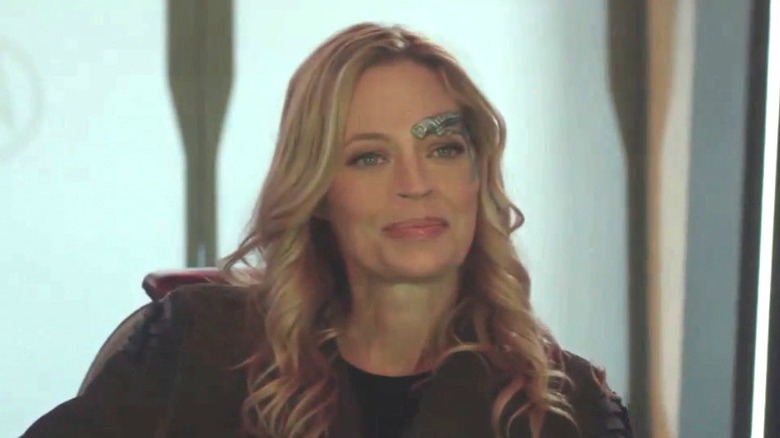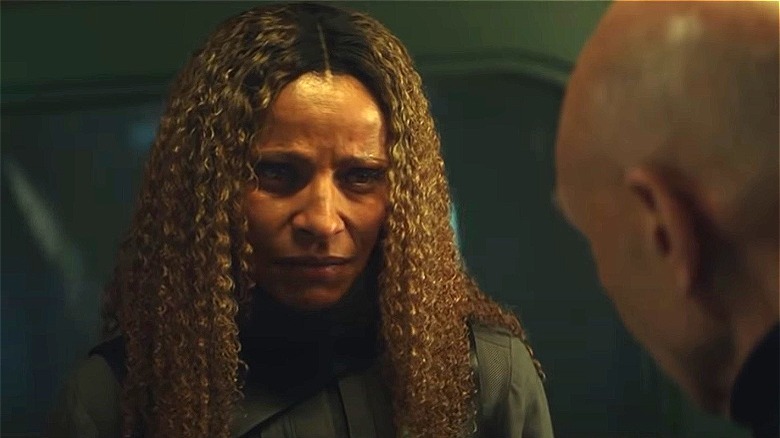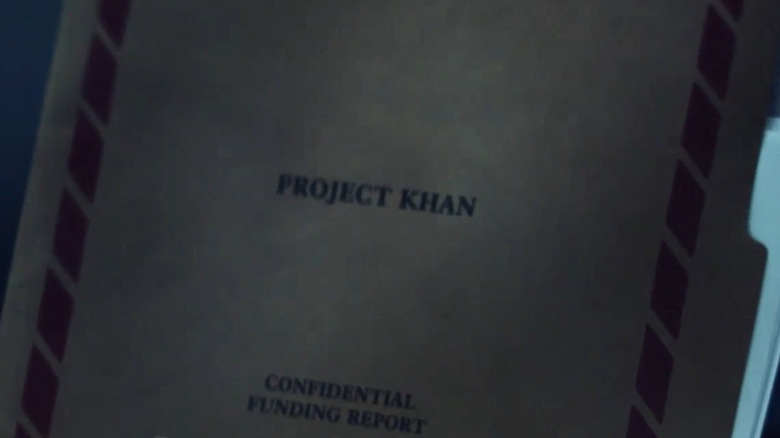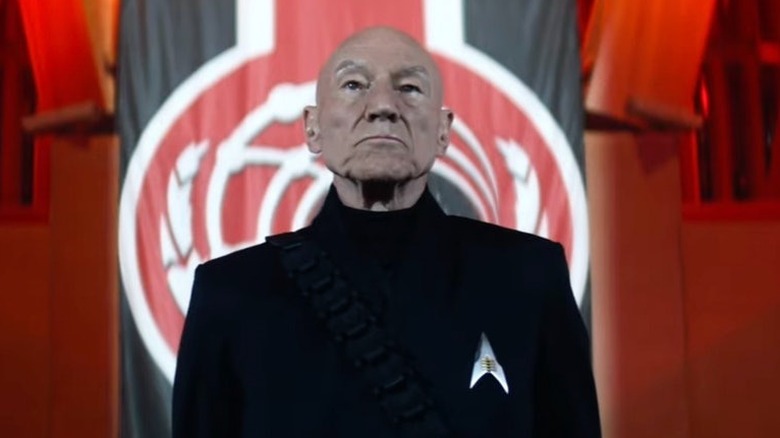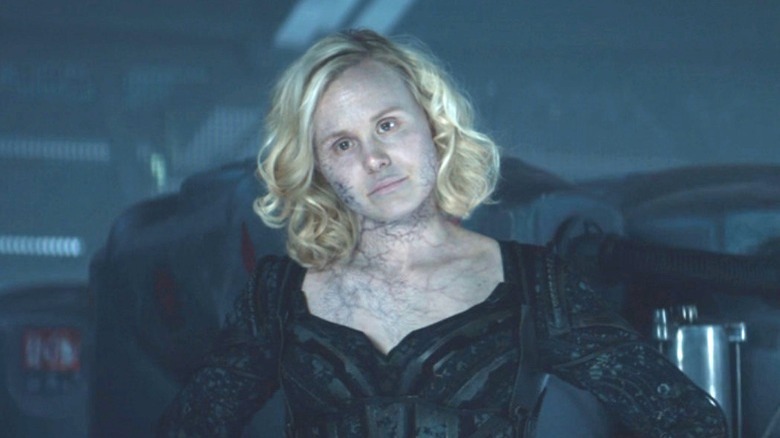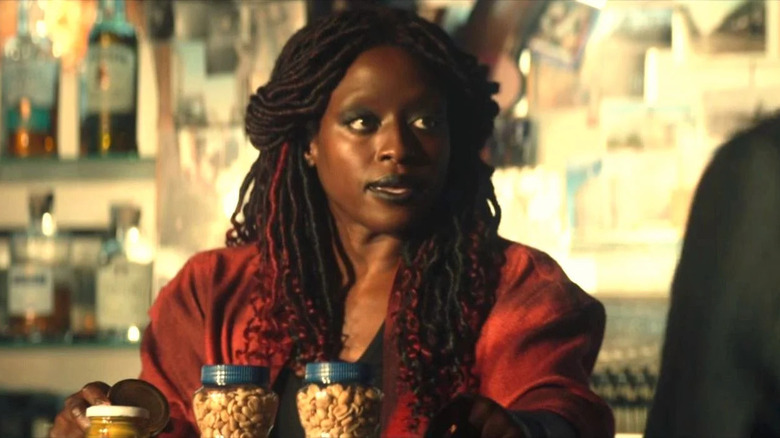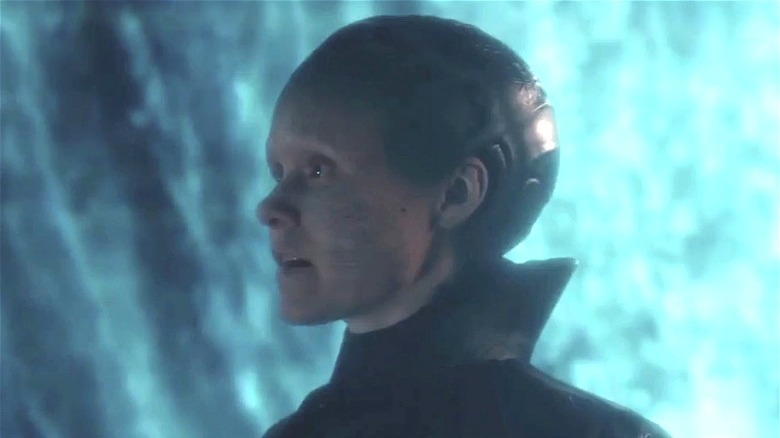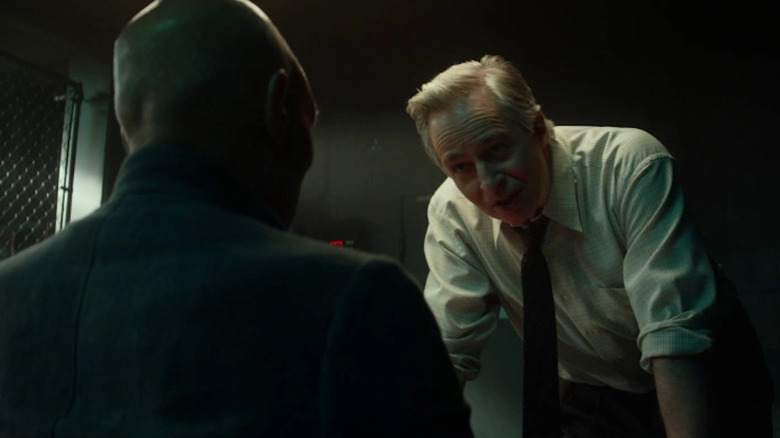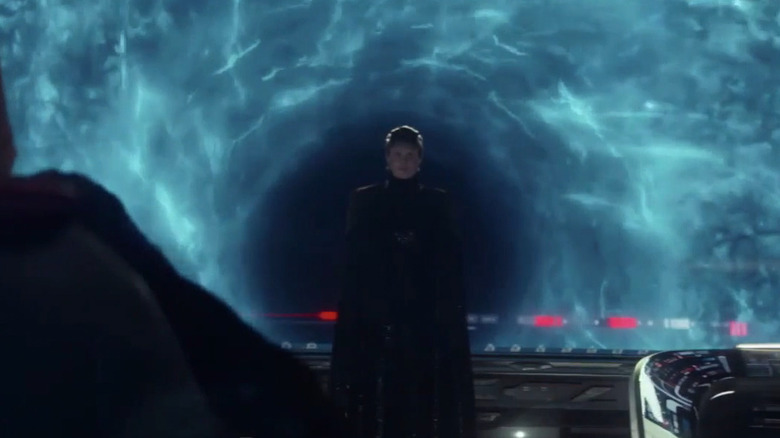Biggest Unanswered Questions In Star Trek: Picard Season 2
Warning: Spoilers ahead.
The second season of "Star Trek: Picard" answered a number of longstanding questions about "Star Trek" lore. We finally got an update on Wesley Crusher and his journeys with The Traveler, and we learned why Seven of Nine never joined Starfleet after returning to the Alpha Quadrant at the end of "Star Trek: Voyager." We also learned about the death of Picard's mother and discovered why exactly the Frenchman speaks with an English accent. The sophomore season had revelations aplenty, but it also left us with a number of unanswered questions.
Multiple stories pan out over the second season's 10 episodes, as Picard, Raffi, Seven, Rios, and Jurati are sent hurtling into a dark alternate reality and then backward in time. While trying to restore history to its correct state, Picard explores a disturbing childhood trauma that has haunted him all his life. And as Q toys with Picard and his crew, he slowly loses his powers. But when it was all said and done, after Picard faced his demons and fixed the timeline, there was still much left unresolved.
Here are the burning questions we still have after the conclusion of "Star Trek: Picard" Season 2.
Are the Q gone for good?
One of the most anticipated "Star Trek" returns since Patrick Stewart announced he was coming back as Picard, actor John de Lancie reprised the role of enigmatic and omnipotent trickster Q in the second season of "Star Trek: Picard." And when he arrived, we knew right away he wasn't the same: More than just older, Q seemed darker, more sinister, and with a bitter edge, even drawing blood from Picard in their first encounter of the series. Once again, Q put Picard through a personal test, getting him to fix a change in time and learn a lesson about himself along the way. While this mirrored episodes like "Tapestry" and "All Good Things," something was different this time around. We'd learn why when it was revealed that Q was dying.
According to Q, he was slowly losing his powers and nearing the end of his existence, something he (and we) did not think possible. In the season finale, "Farewell," Q says he's finally ready to cease being. He uses the last ounce of his power to send Picard and his crew home and bring Elnor back to life. But we wonder, is this really the end of Q and the entire Q continuum? In "Star Trek: Discovery," Starfleet claims that they haven't had an encounter with the continuum in 600 years, leaving a gap that could still be filled.
Are Picard and Laris officially an item?
Season 2 of "Star Trek: Picard" focused not just on Picard's journey through time and his inner turmoil over the death of his mother, but on his struggle to find love. One of the underlying themes is Picard's resistance to forming long term romantic relationships, as the premiere showed his reluctance to get close to his Romulan friend Laris, with whom there was an obvious mutual attraction. Laris seems disappointed when he distances himself from her, and Picard seeks counsel from Guinan on the topic, who notes that he has always kept the women in his life at a distance.
Over the course of the season we learned that the death of his mother and events in his past made him the closed-off person he became. By the end, Picard was ready to embrace a relationship, and on his return to the 25th century he makes it clear to Laris — in his own way — that he is ready to explore his feelings for her. He asks Laris for a second chance, and the two give off some serious romantic vibes. But will we see Picard and Laris together when we catch up with them next season? It could be an interesting thread to explore, especially with Gates McFadden's Dr. Beverly Crusher (a one-time flame who he married in at least one alternate timeline) set to return.
Where does Kore go from here?
In a shocking last-minute twist, Trekkies got the answers to two long-unresolved questions. Wesley Crusher, the son of Lieutenant Commander Jack Crusher and Dr. Beverly Crusher, made a surprise appearance. He revealed that he was no longer in Starfleet and was now a Traveler, just like the enigmatic alien we met on "The Next Generation." Wesley confirmed that he and others like him employ the likes of Tallin and Gary Seven, so-called "supervisors" who monitor historical events and ensure that the timeline plays out as it should.
When Wesley arrives, he's in 2024. He visits Adam Soong's daughter Kore, who he recruits to join him. With her father disgraced and her life a lie, Kore takes Wesley up on the offer, and the two beam away. Though one might suspect that Wesley is enlisting her to be a Traveler, it seems more likely that Kore was recruited to be the next Supervisor. If that's the case, we wonder what this means for her future.
Could Kore be assigned a new subject to monitor in 2024, or some other time period? Could we see Wesley and Kore return in the kind of spin-off that Gary Seven was created for, a show about a time traveling agent watching over important historical events? Producer Alex Kurtzman has teased some upcoming mystery projects in the "Star Trek" universe, and this is one that definitely seems like a possibility.
Is this really goodbye to Rios?
Cristóbal "Chris" Rios was introduced as a rogue captain in the first season of "Star Trek: Picard." He left Starfleet under shadowy circumstances following a scandal and coverup aboard the USS Ibn Majid. He went on to become an independent operator, captaining the starship La Sirena, but at the end of the first season, he returned to Starfleet. Now commander of the USS Stargazer, Captain Rios is transported back in time to 2024 alongside Picard, Raffi, Jurati, and Seven of Nine.
Rios falls in love with a 21st century woman named Teresa, a doctor and mother running a clinic in Los Angeles. In the 25th century, Guinan, confirms that Rios lived out his life there, starting a medical supply company called Mariposa. But is this really the end of Rios' story? If "Star Trek" has taught us anything over the past few years it's to expect the unexpected, and surprise returns are the order of the day.
We know that La Sirena is equipped with a series of holograms that use Rios' image, so it's not impossible that actor Santiago Cabrera could return somewhere down the line as one of his holographic assistants. Rios proved a popular character with fans, with some even demanding a Rios spinoff, so there's a good chance we haven't seen the last of him yet.
Is Seven's future in Starfleet?
Introduced in Season 4 of "Star Trek: Voyager," Seven of Nine has been on quite the journey. She went from a villainous robotic drone to a strong, independent woman with a bright future ahead of her. She expressed interest in joining Starfleet when they returned to the Alpha Quadrant, wanting to follow in Captain Janeway's footsteps. In the second season of "Star Trek: Picard" we learned that her dreams of Federation service had remained just that, as Starfleet rejected her application thanks to her troubling Borg past. Though fellow former drone Icheb was accepted, it seems spending her entire adult life as a Borg (not to mention her further dealings with the collective) made Starfleet wary of Seven.
In the finale of "Star Trek: Picard" Season 2, when Seven and the rest of Picard's team return to the 25th century, Picard gives her a field commission. Reasoning that Seven — who has the most experience with the Borg — is best suited to lead the rest of the mission, Picard gives her the captain's chair. With the Jurati Queen and her unique Borg collective now requesting Federation membership, combined with her field commission, could Starfleet reconsider Seven's application? She might even be the best choice to serve as the Borg Ambassador. Actor Jeri Ryan has already made it clear that she will appear in the series' third season, and it's entirely possible she could be a Starfleet officer when we see her next.
Who will captain the Stargazer?
Raffaela "Raffi" Musiker was once a respected Starfleet officer who served dutifully alongside Admiral Picard during his mission to save the Romulan people from a devastating refugee crisis. In the wake of Picard's failure to save the Romulan people, she left Starfleet and became something of a drifter until she got recruited by the Admiral again during his mission to find Data's daughter. By Season 2 of "Star Trek: Picard," Raffi was back in Starfleet, now serving as a full-fledged commander aboard the USS Excelsior.
With Rios left behind in the 21st century, we wonder if Raffi could be destined to take command of his old ship, the Stargazer. Somebody has to fill the vacant captain's chair, and it could well be her. It would create a strong narrative link, as the original Stargazer was once Picard's ship, and Raffi, as his protégé of sorts, would be a fitting new commander. If Seven of Nine were to get an official Starfleet commission perhaps she could serve aboard the ship in some capacity, as either a science officer, first officer, or even chief of security. With fans calling for Seven and Raffi to continue their roles past the show's third season, and the Stargazer begging for a new captain, this feels like something we may see sooner rather than later.
What exactly is Project Khan?
Perhaps the most surprising new character in "Star Trek: Picard" was Adam Soong, the ancestor of cyberneticist Dr. Noonian Soong, who was seen several times in "Star Trek: The Next Generation." He's also the ancestor of Arik Soong, the evil genius and genetic scientist seen in "Star Trek: Enterprise." Adam Soong's work, like Arik's, is in genetic sequencing. Through eugenics, he strives to create the ideal human specimen. He nearly succeeds with his "daughter" Kore, but in the end even she proves a flawed experiment. In the final episode, "Farewell," Kore exacts her revenge by destroying all of her father's files and research, leaving him a broken man. However, he is left with one piece of work to continue, a folder he pulls from his desk labeled "Project Khan."
Presumably named for classic "Star Trek" villain Khan Noonien-Singh, it seems likely that this folder is ultimately connected to his descendant, Arik Soong. Seen on several episodes of "Star Trek: Enterprise," Arik also uses eugenics experiments to create human super soldiers, and we can't help but wonder if Project Khan is the beginning of that research, if not the very project Arik is working on more than a hundred years later. It's a powerful tease but leaves an important mystery: what is Project Khan, and how far does Soong get with it? Did Arik pick up his work at some point in the future, or was his work on "Enterprise" something entirely different? While Adam and Arik are separated by a century, it seems their work could be more linked than we realize.
How would Renée's death result in a totalitarian timeline?
"Star Trek: Picard" Season 2 took the titular character on a mission to restore a timeline fractured by Q. An important event in the past had been changed and all of time altered as a result. We learned that it centered on Picard's ancestor Renée, an astronaut who led a mission to Europa in 2024. Without her mission, all of time was rewritten, and the future twisted into a dark reality where non-humans were subjugated by the Confederation, and Picard himself waged a violent war of oppression.
In the finale we learned that on the Europa mission, Renée Picard would discover a unique alien organism that would aid in the fight to save Earth's environment. New technologies would apparently be developed that would "heal the ocean and clean the sky," as Guinan put it. The failure of the Europa Mission might have meant the continued decimation of Earth's environment, but it's not made entirely clear how that would have led to a totalitarian world government in the 25th century. Nor does it explain why Adam Soong would be known as an anti-alien tyrant.
In the 25th century the Confederation had a monument to Soong with his mantra that "a safe galaxy is a human galaxy." But in Adam Soong's time of 2024, first contact with intelligent alien life is still at least 40 years away, and very likely not within his lifetime. What happened in between that led him to take such an aggressive, anti-alien stance, and why was it embraced before humanity had met any aliens at all?
What has Jurati been doing for 400 years?
"Star Trek: Picard" Season 2 saw the Borg Queen manipulating Dr. Agnes Jurati. It was evident that the Queen's motives were anything but noble, and fans began feverishly speculating about what this could mean for the future of the Borg. Trapped in the 21st century and imprisoned in one mind, Agnes and the Queen slowly merged into a single, sinister new hybrid. Would Agnes become the first Borg Queen, and birth the cyborg race in 2024? Would she end up creating the Borg in the 21st century, as Seven of Nine feared? Not quite.
At the urging of Jurati, the Borg Queen slowly comes around and the two create a merged personality with a new goal: To save wayward, dying souls and resurrect them as a new kind of Borg collective. "A better Borg" built on cooperation and salvation, not assimilation. The Jurati Queen (in 2024) takes the starship La Sirena and leaves for parts unknown. The next time we see her in the 25th century, she has a new, massive starship and is asking Admiral Picard about joining the United Federation of Planets.
That's all great, but the question remains: What was the Jurati Queen doing for the past 400 years? Was she hiding in a distant part of the galaxy, so as not to disrupt the timeline? Did she build a collective elsewhere? Did she take part in galactic affairs we've been unaware of? There's now a 400 year gap that needs a little explaining.
How does Guinan recall her relationship with Picard?
During "The Next Generation," the relationship between Guinan and Picard was fraught with mystery. Some of it was resolved in the two-part episode "Time's Arrow," in which Picard traveled back to 19th century Earth and met Guinan. From her perspective, it was their first meeting, but all that changed in "Star Trek: Picard." Leaving from an altered timeline, Picard meets Guinan in 2024, and for her, their encounter in the 1890s never happened, because the future Picard left from in "Time's Arrow" no longer existed. It seemed that now their first meeting occurred in 2024.
But with their mission complete, and the timeline from "Time's Arrow" now restored, it would seem they've met twice in the past — in 1893, and again in 2024. However, in that version of 2024 she said she'd never met him, so (back in the 25th century) how exactly does Guinan's memory of Picard work? Are we now in a timeline where they never met in the 19th century? Or is this another case of infinite fragmented timelines we're living through? Maybe this is one question we shouldn't be asking. At times like this, it's best to follow the Janeway doctrine: Don't think about it, or it'll give you a headache.
What is the status of the Borg?
In the opening episode of "Star Trek: Picard" Season 2 we are given a brief update on the status of the Borg. Jurati notes that they are "functionally hobbled," implying that all the destruction in the "Star Trek: Voyager" finale may have dealt them a crippling blow. Between that and the drone uprising seen in the "Voyager" two-part episode "Unimatrix Zero," it appears they aren't much of a threat anymore. By the end of Season 2 of "Picard," though, we've met a new Borg collective led by a more benevolent Jurati Queen hybrid. And she arrives with an unexpected request: They want to join the United Federation of Planets.
According to the new Borg Queen there is an emerging threat that requires their attention, and provisional Federation membership will allow them a safe haven to monitor the danger. Will they be allowed into the interplanetary alliance? And what connection does this new Queen have with the Borg that originated in the Delta Quadrant? If the original Borg collective is weakened, could we see the new Queen take control of them? These are just some of the many fascinating questions to consider with the creation of a new and better Borg.
What became of Agent Wells?
A new character introduced midway through the second season of "Star Trek: Picard," FBI agent Wells began tracking Picard and his crew when they first beamed down to Los Angeles. A man with a personal vendetta against extraterrestrials, he believes Picard and Guinan to be aliens (he's at least half right), and it's later revealed why. As a young boy in the late 1970s, Wells had an unwitting encounter with a group of Vulcans surveying the planet long before first contact. Though the Vulcans had tried to wipe his memory of the encounter, it failed and left him with a drive to find them again, or others like them.
Once Picard explains the truth (that he's there from the future to protect the timeline) Wells aids him by setting him and Guinan free. We never see Wells again though, and we are left with burning questions about what became of him. He is one of just a handful of ordinary humans with knowledge of aliens and time travel. Given his awareness of Rios, is it possible he kept in touch with him and Teresa, or even Guinan herself? Could he have helped found the medical supply company run by Rios? With his striking resemblance to Lieutenant Ducane from the "Voyager" episode "Relativity" (they're both played by the same actor, Jay Karnes), it's also possible that a future descendent of Wells will one day become a time traveler.
Who created the transwarp hub?
Season 2 of "Star Trek: Picard" left us with several unanswered questions, and perhaps the biggest of the bunch closes out the finale. After the combined efforts of the Nu Borg and the Federation fleet prevent a disaster, a unique anomaly is created in the form of a transwarp conduit. Seven of Nine recognizes it right away and notes that it is unlike any she has seen before, and that's notable given her lengthy experience with Borg transwarp conduits. Picard wonders who created the conduit, implying that this was not a natural phenomenon. What's most interesting is what the Nu Borg Queen has to say, noting that its creation confounds even her.
"Even with our collective knowledge that answer remains elusive," she tells Picard. "What you see is a piece of the puzzle whose final image is unclear but is tied to a threat... one which requires close observation." It's an ominous closing message, but if there's one question likely to be resolved in Season 3, it's this one. It appears that Picard will need the help of his former Enterprise crew if he's going to discover the answer: The entire cast of "Star Trek: The Next Generation" is joining the final season of "Star Trek: Picard."
